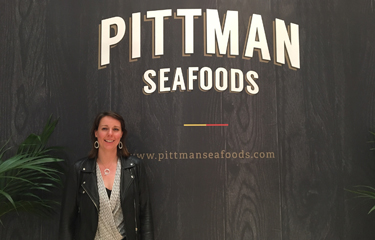Pittman Seafoods hits EUR 50 million in sales

Zeebrugge, Belgium-based Pittman Seafoods has surpassed EUR 50 million (USD 44.7 million) in annual sales, according to CEO Yoke Vandepitte.
Founded in 1990 in a seaside town near Bruges, Pittman Seafoods has grown into a worldwide supplier of frozen seafood to retail and foodservice outlets. The company has 30 employees and ancillary sales offices in Germany and Chile, Vandepitte told SeafoodSource at the 2019 Seafood Expo Global in Brussels, Belgium last week.
The company’s business is mainly in Europe, focused in Belgium, France, Holland, and Scandinavia, Vandepitte said, and it sells mainly to retail, but it does some private label work. On the foodservice side, it counts Sodexho and Compass as customers. It sells pollock, salmon, cod, King crab, mussel meat, sole, pangasius, and scallops. It operates its own processing line in Zeebrugge, and also offers ultra-high pressure lobster from Canada.
While remaining competitive on price, Pittman’s “value-add” is in its quality control and the trust its customers can place in it on its sourcing, Vandepitte said.
“We’re proud we’re still a family company amongst all the multinational, private equity-backed companies that are out there now. Still, we really battle to give competitive price and then we really feel the appreciation of our customers for the service we are doing every day,” she said. “We think that has a value too.”
Working exclusively on the frozen side of the seafood industry – Vandepitte calls it “frozen convenience” – isn’t limiting, but rather offers plenty of opportunity for growth, she said.
“It’s not at all hard to do well, if you focus on doing things right,” she said. “There are enough customers who still have a very large frozen range and who want premium frozen products. There’s an ever-bigger demand for seafood protein, and it’s just not possible to have everything fresh. And besides, our customers know that, in many cases, frozen is better quality than fresh.”
Pittman’s customers are often looking for a stable year-round supply, and buying frozen offers them that consistency even for seasonal products, Vandepitte said.
“This way, they can be more flexible in their production schedule,” she said.
Recently, the company has branched into frozen sushi products that can be prepared in one minute in the microwave, with an additional 10 minutes of rest. The six different rolls feature mackerel, smoked salmon, roasted salmon, tuna, scampi, and tofu.
“It’s amazingly convenient, and we’ve found people really like it,” Vandepitte said. “We’ve actually been a bit surprised by how successful it has been, especially amongst catering companies and cruise lines – people who need to put out big volumes of sushi.”
Vandepitte noted to SeafoodSource that her customers are becoming more demanding in requiring sustainability labels. Fortunately, she said, suppliers are achieving certification at higher levels to match the demand.
“It’s a difficult issue. Sometimes, it’s a choice between letting a fish die and giving it a sea lice treatment. And some fishing companies cannot afford certification,” she said. “But clean labels and sustainability are becoming more and more important for our customers and so that is the way things are going.”
Another major issue affecting business is the ongoing trade war between the U.S. and China, Vandepitte said.
“It’s affecting raw material prices,” she said.
But Vandepitte trusts the company’s governing philosophy to guide it through both good times and bad.
“You never know what will happen. We always tell our team, ‘You cannot control the waves, so you have to learn to surf them.’”






Share